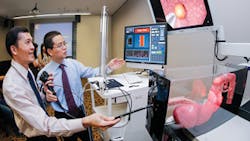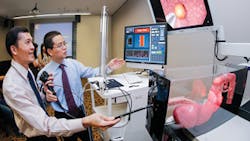CONFOCAL RAMAN SPECTROSCOPY: Raman-based in vivo system provides objective diagnosis of pre-cancer in real time
An in vivomolecular diagnostic system has proven clinically capable of real-time pre-cancer diagnosis during gastrointestinal endoscopy.1 While conventional endoscopy relies on an individual doctor's "eyeballing" followed by a pathologist's analysis of a biopsy specimen several days later, the new approach uses computer analysis of biomolecular data to objectively diagnose while the procedure is underway.
The system, developed by researchers at the National University of Singapore (NUS), is based on confocal Raman spectroscopy; it includes a proprietary confocal fiber-optic probe and customized online software control. The fiber-optic probe collects a biomolecular "fingerprint" of tissues in <1 s while the online software enables biomolecular information extraction and analysis. Doctors are able to present a diagnostic result during the examination.
The system has been used in more than 500 patients in Singapore with stomach, esophageal, colon, rectal, head and neck, and cervical cancers. The researchers have filed two U.S. and two UK patents for their invention, following publication in more than 40 peer-reviewed journals. Led by associate professor Huang Zhiwei in the Department of Biomedical Engineering, the team now plans to conduct clinical trials on a larger scale to further validate the system's clinical utility, particularly for gastrointestinal cancers.
1. M.S. Bergholt et al., Gastroenterol., 146, 1, 27–32 (2014).

